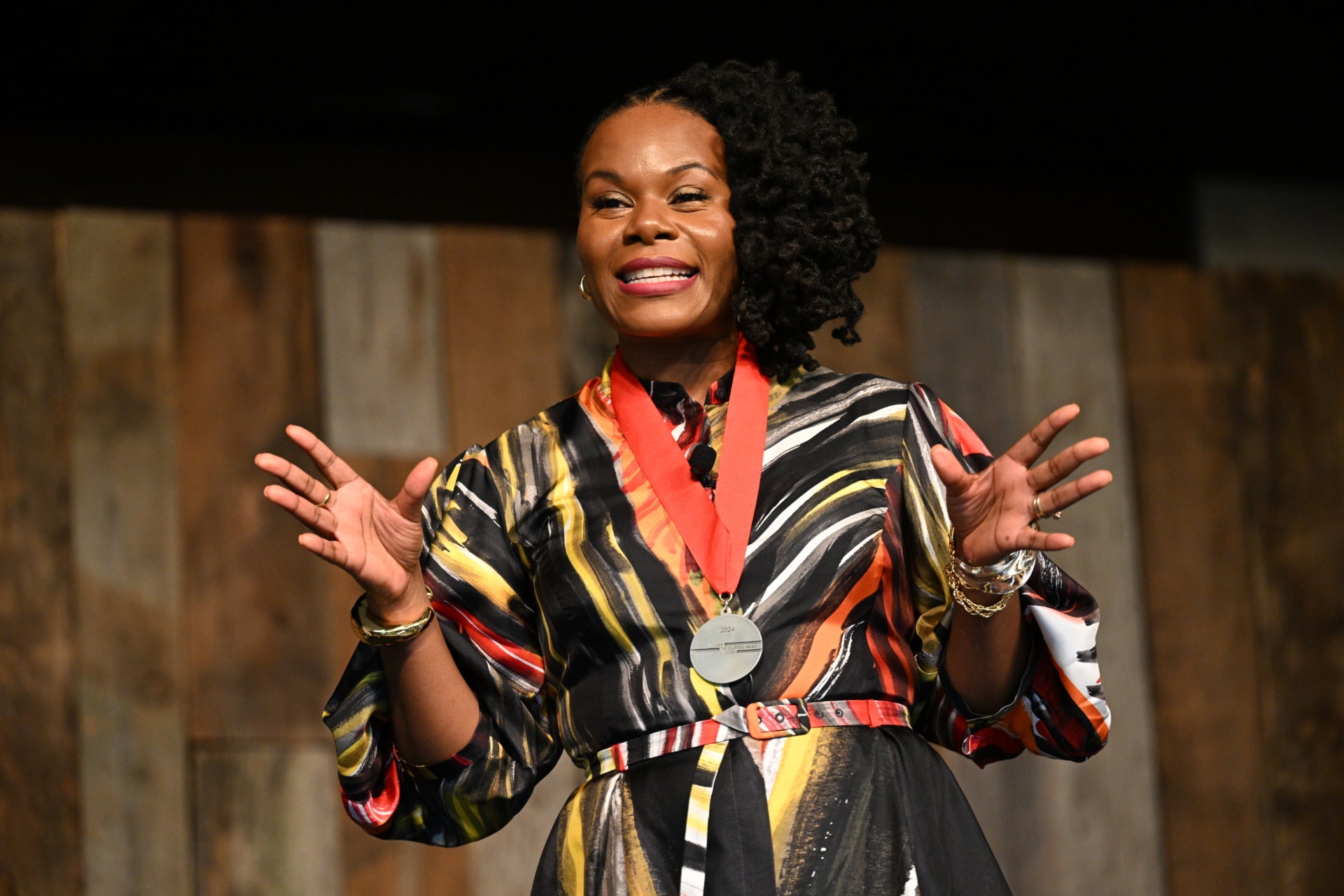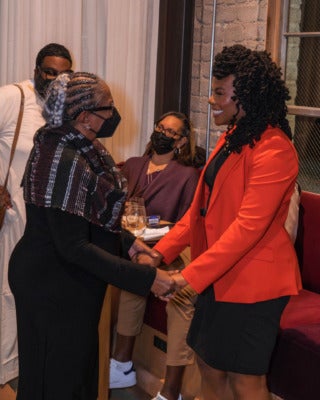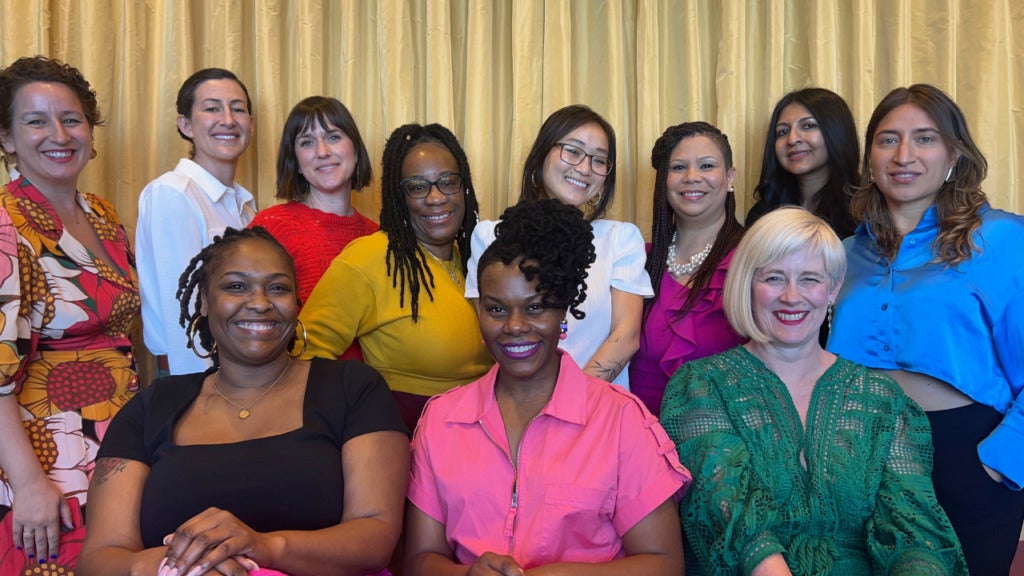What comes to mind when you think about the climate crisis? You might picture increasing pollution, degrading environment, resource scarcity, and suffering communities. Rarely do we think about justice. Gloria Walton (Civil Society Fellow), CEO and President of The Solutions Project (TSP), is shifting the narrative around the climate crisis to one about climate justice, community power, and solutions – starting by centering and resourcing the exemplary leadership by people on the frontlines of the problem. “For us, it’s about reclaiming our narratives,” Walton says. “Our communities are too often depicted as victims when, in fact, we are victors.”
Under Walton’s leadership, TSP funds and amplifies frontline climate solutions led by Black, Indigenous, Asian and Pacific Islander, Latine, and other communities of color. Why? Because each year, over three million people are displaced by climate disasters, the majority from communities of color, and more than 100,000 die from air pollution. These historically disinvested communities, situated at the intersection of racism, poverty, and pollution, face the brunt of climate change. Experiencing these impacts firsthand, these communities often have the most impactful solutions, yet less than 2% of U.S. climate philanthropy goes to BIPOC-led grassroots groups. This is why TSP is working to resource these solutions like never before.

Gloria Walton (Civil Society Fellow) CEO & President of The Solutions Project takes center stage at the Resnick Aspen Action Forum in Aspen, CO, on Tuesday, July 23, 2024. [Photo by Dan Bayer]
90% of TSP’s funding goes towards people of color-led and 80% to women or nonbinary-led organizations; their support has impacted more than one million people directly and benefited more than 100 million through policy wins over the past three years.
For changing the face of climate solutions and defining a new narrative for climate justice, Gloria Walton was named a 2024 John P. McNulty Prize Winner at the 2024 Resnick Aspen Action Forum. We had the opportunity to sit down with her to discuss her transformative work during the event. In this Q&A, Gloria opens up about the crucial moments that shaped her leadership, the deep influence of her grandmother and mother, the invaluable lessons she’s learned from working alongside diverse communities, and her vision for advancing community-based climate justice solutions.
Was there a pivotal moment in your leadership journey that led you to take on this challenge?
When I think about a moment in my leadership journey that led me to take on the challenge of climate justice, I trace it back to my formative years living with my grandmother. My grandmother was a farmer and she was someone who instilled my foundational values: a sense of community, collaboration, care, sharing, honesty, and love. She would have me, at three or four years old, run across the street with essentials like sugar, eggs, and milk for our neighbors, and she even carpooled to church with them. I grew up in poverty, though I didn’t realize it then because I was surrounded by so much love. The love that I was surrounded by is what drives the love I have for our communities.

Gloria Walton with Linetta J. Gilbert, a highly regarded leader in community development and philanthropy, at Black Climate Week 2022.
Once I got older, I attended schools that were predominantly white. I started seeing how my friends were living compared to my family was living. This sparked my political consciousness, leading me to question, read, and reinterpret my history in a way that empowered me. Because ultimately, we have a choice to be empowered. Growing up in poverty made me passionate about finding pathways out of it, which led me to community organizing.
I started organizing in South Central Los Angeles, a predominantly Black and Brown, working-class community. While many in the community are low-income, South LA is also one of the most powerful communities I know. My initial focus was economic justice, driven by the desire to eradicate poverty, especially for communities of color disproportionately affected by it. Around 2004 or 2005, my colleagues and I researched the next growth sector, with a focus on job creation, and identified climate as an emerging sector, with the potential for trillions of dollars to flow into it. For us, it was about making sure that flow of resources doesn’t overlook communities that look like me.
I realized that while economic justice is an all-encapsulating issue, climate justice is the intersectional issue of our time, encompassing everyone and everything. It wasn’t just about jobs and the economy; it also encompassed air quality, water, transportation, agriculture, food justice, and more. Regardless of your focus, you can always connect it back to climate, because it’s not just about people, it’s also about our planet.
Tell us about The Solutions Project model for change and philanthropy. What is the impact you’ve had so far?
Frontline communities face a disproportionate impact from various intersecting, compounding issues, yet funding for these movements is minimal. Less than 4% of philanthropic dollars go to climate and the environment, and a fraction of that goes to most impacted communities—Black, Indigenous, Latine, Asian, Pacific Islander, and other communities of color. That’s a story that needs to be changed.
Philanthropy means “for the love of humanity,” but when you look at the flow of dollars and the fact that they are not flowing to the communities that are most impacted… something about that story doesn’t look so loving. That’s why I joined The Solutions Project – because I wanted to disrupt that status quo. We need to resource our communities to succeed, which means stepping into unconventional spaces, amplifying our stories, solutions, and victories, and fundraising like never before.
At The Solutions Project, we build bridges and connect our partners to funding. But given the historical underinvestment in these groups, our role is also to move supplemental dollars into the movement. We aim to fortify and cultivate movements from the ground up. In the past three years, we’ve moved over$50 million to more than 300 grassroots organizations across the U.S. and Puerto Rico.

Working alongside the community you serve has been key to creating effective solutions. How has community partnership influenced your approach and impact?
Decisions are made every day, with or without us. In our work, we’re accountable to frontline communities, working on their behalf and alongside them, maintaining a structural relationship with them. This means we strive for alignment, are in constant conversation, and never too far ahead. Our work is entirely relational, built on trust developed over time through our work.
I spent 16 years organizing on the ground, and even now in the philanthropic space, I still identify as an organizer. This experience taught me that I must stay connected with the communities I’m accountable to, ensuring they have a seat at the table—or better yet, are creating the table. I’m proud to facilitate spaces where they are the decision-makers.
At my organization, we have a body called philanthropic trustees, which includes grantee partners and leaders we’ve built long-standing, trusting relationships. They have a pulse on the ground and help inform our strategy, from grant-making to building relationships and connecting partners to opportunities. I never feel alone, and that’s the beauty of being part of a movement—it’s never about one person, but about our collective efforts.
The road to impact is long and winding. What’s been your biggest learning around your own leadership in building your organization? What advice do you have for other leaders in similar roles?
One of my biggest lessons, which I’m still learning, is the importance of self-care as a leader. I strive for excellence and can be my own worst critic. But as leaders, we’re often focused on taking care of others, showing up, and sacrificing for the people we love, sometimes forgetting that we need to include ourselves in that circle of care.
My higher self knows that the love I give should also be received, but it’s tough to accept help when you’re used to being the one who helps others. This week at the Action Forum, I experienced this firsthand, feeling deeply connected to my humanity. While my higher self understands this, my human side can struggle with not being perfect or performing at my best.
Leadership comes with a heavy sense of responsibility; it’s not about us, but about the issues and communities we care for. This weight often makes us feel like we must always keep going, never showing when we’re tired or in need of help. Many of us push through tough days without asking for the support we need.
A key lesson is to stay connected to our humanity—recognizing that even the strongest leaders need breaks, joy, family time, self-care, and peace of mind. This wisdom is something my higher self knows well, but my grounded self is continually working to embrace it.
At this year’s Action Forum, we’ve been focusing on the theme of working across differences and creating a sense of belonging, even in the face of disagreements. Drawing from your experience in the highly polarized field of climate, what insights can you share on effectively navigating and working with differences?
My journey into philanthropy, especially in an intermediary role, has been quite interesting. In this position, I find myself between grassroots movements and large philanthropic institutions with endowments—resources that organizations like mine don’t have. I fundraise on behalf of these movements, and stepping into this role initially caused a bit of an identity crisis. As an organizer, I’ve always been driven by strong values and convictions, and transitioning to leading The Solutions Project meant accepting that I’m no longer on the ground as an organizer. That realization was tough.
Once I accepted it, I had to ask myself, ‘If I’m not that, then what kind of organizer do I need to be now? What does the movement need from me at this moment?’ This has meant stepping into spaces that our movement leaders might not have the time or capacity to engage with because they’re deeply involved in the essential work of organizing and power building. It also involves engaging with people who may not traditionally be part of our justice movements, which we can think of as building bridges across divides, whether those are political or otherwise.
What I’ve learned is that, in these moments, it’s not about compromising your beliefs or vision. It’s about fully leaning into who you are, showing up authentically, and being transparent. When you do that, people can choose whether they want to align and collaborate with you. I’ve encountered both scenarios: connecting with people who initially seemed misaligned with my views, but through conversation and relationship building, finding common ground; and others where, despite our differences, we still part ways respectfully because we both stood true to our beliefs.
This isn’t easy—it’s challenging because everyone, regardless of their position, believes in the righteousness of their work. I truly believe that our movements are fighting for justice, but I also recognize that others who don’t share my values feel the same about their efforts. Understanding this allows all of us to show up authentically and hold true to our beliefs.

Gloria Walton with her team at The Solutions Project.
In reflecting on the theme for the Action Forum this year – Only Light Can Do That – what do you find sustains you personally? What gives you hope or resilience in times of challenge?
To do this work as long as I have, starting from a young age, you need to be grounded in Spirit. I’m a prayer warrior—I will get on my knees and throw up these hands in a minute to surrender, let go, and trust God and The Universe.
I know I can’t do this work alone. What gives me hope is knowing I’m not alone and that I’m connected to grassroots movements for change. Our movements are leaderful, resolute, and victorious, which energizes me. They’re rooted in love, where we see each other’s full humanity, lend a helping hand, and check in with each other. Those are the things that get me through, that sustain me in this work.
I always pay tribute to my grandmother, my mom, and all the matriarchs in my family who raised me.
What brings me hope is knowing that around the world, Black, Indigenous, Latin, Asian Pacific Islander, and other communities of color are organizing and building power for effective change, justice, and peace—for everyone. That’s the thing that’s different about our movements. Even though our communities are disproportionately impacted, when we invoke change, it’s for everyone. Everyone benefits. We’re not just looking out for ourselves, our families, and our communities. We’re looking out for our world and our planet.
Learn more about The Solutions Project’s work in the mini-documentary created by Freethink and the McNulty Foundation.
About the John P. McNulty Prize: Created in 2008 by Anne Welsh McNulty in honor of her late husband, the Prize in partnership with the Aspen Institute awards $150,000 to each winner, along with support to elevate their efforts. The winners are selected by a distinguished international jury, which includes leaders like Darren Walker, Cheryl Dorsey, Olara Otunnu, and Brizio Biondi-Morra.
About the Aspen Global Leadership Network: The Aspen Global Leadership Network (AGLN) is a dynamic, worldwide community of nearly 4,000 entrepreneurial leaders from over 60 countries. Spanning business, government, and the nonprofit sector, these leaders share a commitment to enlightened leadership and the drive to tackle the most pressing challenges of our times. Through transformative fellowships and gatherings like the Resnick Aspen Action Forum, AGLN Fellows have the unique opportunity to connect, collaborate, and challenge each other to grow and make a meaningful impact.
More on the Resnick Aspen Action Forum: Under the theme “Only Light Can Do That,” inspired by Dr. Martin Luther King Jr., the 2024 Resnick Aspen Action Forum was an invitation for leaders to reflect on finding resilience and hope during challenging times and discovering common ground despite differing views. Explore more inspiring content on leadership and change-making from the Action Forum here.

